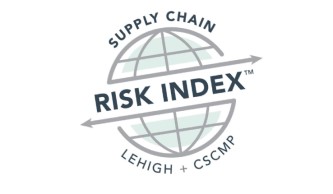The second quarter results of the Lehigh Business Supply Chain Risk Management Index (LRMI) showed cybersecurity and economics as the two highest risks for the third straight quarter. While it is number one, cybersecurity had the lowest score for a number one risk since the LRMI started three years ago.
In addition, the overall risk score is the lowest in the last three years.
The LRMI was developed by the Center for Supply Chain Research at Lehigh and the Council of Supply Chain Management Professionals in order to rank 10 broad categories of supply chain risks. The risk categories are cybersecurity, economics, transportation disruption, supplier, government intervention, operational, quality, customer, technological and environmental.
“The LRMI allows executives and supply chain managers to look ahead and prepare for risks that will become important in planning for the next quarter,” said Zach G. Zacharia, associate professor of supply chain management and director of the Center for Supply Chain Research at Lehigh.
Economic risk was second overall, but the score dropped sharply as well. “Economic risk has been one of the top three risks in every quarter in the last three years,” said Zacharia, “but you have to go to the first quarter of 2021 to have such a low number for economic factors such as energy costs, labor shortages and sudden demand shocks.” Customer risk came in third, also at a reduced score from previous quarters.


